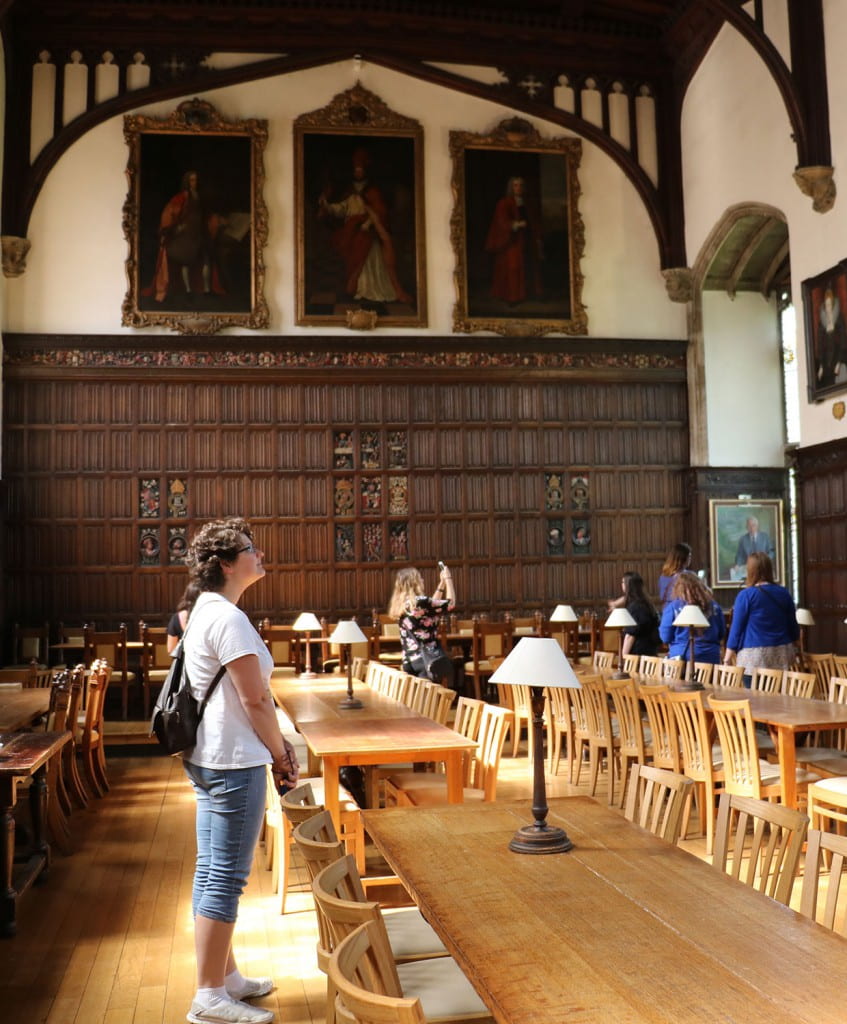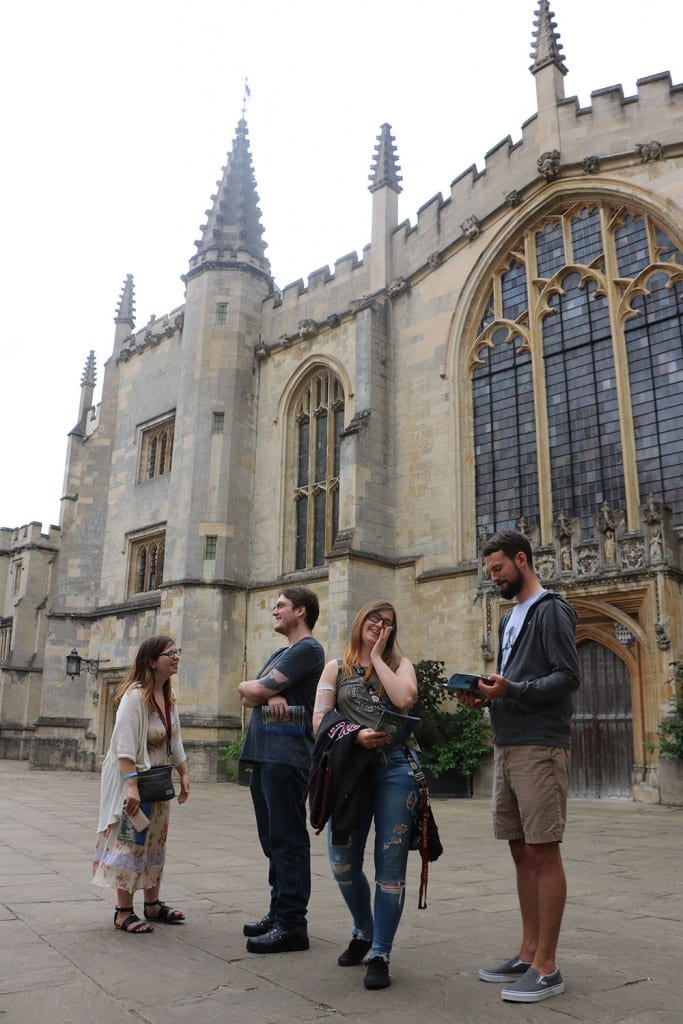
Dining halls in Harry Potter movies were inspired by those in Oxford.
Imagine walking in the shoes of such literary greats as T.S. Eliot, Oscar Wilde, J.R.R. Tolkien, C.S. Lewis and Lewis Carroll; breathing in the urban and pastoral aura that inspired some of the greatest writing works of all time. For Emily Ransom’s students, there is no need for literary flights of fancy; they’ve lived the dream.
Every summer, Ransom, a UW-Green Bay assistant professor of humanities, leads a travel course to Oxford, England. This four-week, six-credit course explores fantasy literature and poetry of authors local to the region. While doing so, they travel to the places that inspired the works and also emulate these authors’ techniques in a creative poetry writing class. “It’s an English/Humanities course” Ransom explained. “We stay at a medieval college in the heart of the city and take many excursions in Oxford and the surrounding regions.”
A typical week during the course
Class time is in the morning. First up is fantasy literature with readings and discussions of Tolkien, Lewis, Carroll and other fantasy literature authors. The second class is creative writing—studying and imitating the form, content and style of such poetic greats as Eliot and Philip Larkin. The afternoon is tour time, filled with colleges, authors’ homes and museums. Twice a week, they take part in theatrical performances and concerts. Friday trips include castles, Stratford-upon-Avon, Bath or Stonehenge. Weekends are free for students to create their own experience. London is only an hour away with access to Ireland and Europe just a train passage, a shockingly-cheap flight, or a Megabus trip away.
Free to do what they want on the weekends, students need to be accounted for by Sunday night when they reconvene in the campus churchyard for a poetry reading. Each student brings one poem written by an Oxford poet and one of their own.
The experience may not transform a student into a great poet, but it is still transformative. “It’s a fully-immersive experience,” said Ransom. “Our goal is to get the students to feel at home there; for them to feel like they belong in this intellectual hotbed of talent and literary tradition.”
The results? Brilliant!
“It was only a month, but it felt so much longer because we experienced so much,” said Hannah Majewski, an English major graduating in May 2020. “The history, pub culture, architecture, museums, authors’ homes…it was all so stunning. Every morning, I would wake up, sip on a cup of tea, and look out my dorm room window (at St. Edmund Hall —known fondly as Teddy Hall). I would gaze at the medieval well in the middle of the quad. It was so old, probably built in the late 1100s. It was awe-inspiring. To be a part of so much history and intellect, if only for a month, was unforgettable.”
 Within Oxford and Cambridge (aptly called the Oxbridge system) lies a network of colleges. Wherever you go, there’s a college nearby. “University is all over the city,” said Ransom. “Oxford looks exactly like it is always imagined in the writings of its authors; the sculptures, rivers, pastorals, architecture. When you’ve spent time reading the stories by these authors, it offers a strange sense of being home.”
Within Oxford and Cambridge (aptly called the Oxbridge system) lies a network of colleges. Wherever you go, there’s a college nearby. “University is all over the city,” said Ransom. “Oxford looks exactly like it is always imagined in the writings of its authors; the sculptures, rivers, pastorals, architecture. When you’ve spent time reading the stories by these authors, it offers a strange sense of being home.”
Oxbridge system is a small, tight-knit community, Ransom explained. It provides an atmosphere of chance encounters, story sharing and intellectual conversation. “Oxford is fun, bustling and saturated with culture and beauty,” she said. “The colleges throughout the city provide a lot of green spaces, so you also get a pastoral feel that creates a quiet place of refuge.”
For students like Majewski, experiencing such a profound sense of history and place not only inspired creativity, but also changed her life. “I have a deeper appreciation and greater understanding for not only the Oxford authors, their writing and the places that inspired them, but also for the connections that appreciation and understanding continues to create in my own life.”
For Professor Ransom, the student outcomes for the course transcend literary appreciation.
“I love watching the transformation in my students. It touches them on so many levels and creates a lasting impact on their lives. These lessons are souvenirs they will keep for a lifetime. On an educational level, students can make connections from a text they read and help them problem solve. On a social level, it impacts their global consciousness and empathy toward other cultures. On a metaphysical level, it transforms their inner selves.”
From Hannah Majewski’s perspective, she found traveling to another country and time a grounding experience, connecting her to her love of literature, history, imagination and creativity. “When I feel disconnected, thinking back to that experience grounds me. It had such an impact on me that just thinking about it…the beauty, the history, the reverence, the aura…it calms me and inspires me all at the same time.”
—Story by freelance writer Kim Viduski ’92


